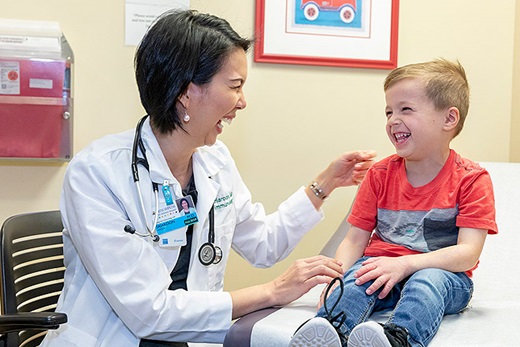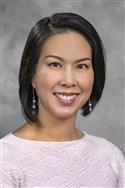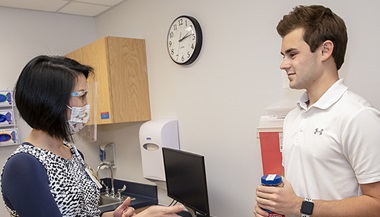Patient Story
Food Allergies: Samuel's Story

Just days from giving birth to a beautiful baby girl, Carissa and her husband found themselves in the hospital with their then 2-year-old boy Samuel. “I was about to have a baby, but I couldn’t leave his side,” Carissa recalls. “He was just so sick. It was very scary.”
A Tough Beginning
By the time he had reached 9 months, Samuel’s eczema was proving to be something much more. The dry, itchy rash was breaking out all over his body. “Every time we fed him, his face and mouth would turn red. It got worse and worse. When he broke out in hives and repeatedly vomited, we knew we had to do something more,” she says. His parents were terrified. They immediately took him to a respected pediatric allergist in Tampa and had allergy testing done. They were given a long list of foods that Samuel was allergic to and told to avoid them.
If only it had been that easy.
Samuel’s parents followed all of the complicated and limited feeding instructions and kept up treatment for what they thought was his eczema along the way. They were told he had a 20 percent chance of outgrowing his allergies. He didn’t.
“It was a constant struggle. He broke out no matter what we did,” she recalls. “We cooked special foods. We examined every label. We tried everything.” They took him back to the allergist but felt as though, in spite of how careful they’d been, they were being blamed for not being careful enough. The physician didn’t want to do additional testing and called it, “torture.” He told the family to be more careful.
The limited diet was creating havoc on poor Samuel’s digestive system, and he ended up in the hospital for a four-day stay as Carissa was preparing to give birth to his baby sister. Something had to change.
In the midst of all of the chaos, Carissa had started a new job at Johns Hopkins All Children’s Foundation. She found out the hospital collaborates with USF Health on an allergy and immunology clinic. She was aware of their caring and child-friendly demeanor and decided to try a second opinion.
“As a loving and educated mother, she went full bore on trying to care for her child,” explains Panida Sriaroon, M.D., medical director of USF/Johns Hopkins All Children’s Hospital Allergy/Immunology Clinic. “Part of Samuel’s issue was that he was so limited on foods he could eat. It was affecting his nutrition along with the whole family dynamic—how all of them were eating and shopping.”
Sriaroon knew Samuel needed more testing, but first they had to clear up his eczema. “Mild eczema is common even in healthy babies and usually there is nothing to be worried about, but Samuel had flares all over. The first thing we needed to do was correct his skin-care routine.” Carissa was afraid to bathe him too often, thinking that would dry his skin. The opposite is true. Hydration can be accomplished through bathing, Sriaroon says.
“We recommend bathing for 10-15 minutes one or two times a day using hypoallergenic or fragrance-free soap. Luke warm water. Then pat dry and immediately apply topical medications for inflamed eczema lesions, and cover with thick moisturizers, creams or ointments which should be applied generously to other areas.” Sriaroon then recommends using a wet-to-dry gauze application and long-sleeved pajamas within 3-5 minutes after bath. She then went to work on his allergies.
“The problem with food allergy testing is that both skin and blood tests can be false positive so we need to interpret the results carefully. Samuel was given a long list of foods he shouldn’t eat that he had never even tried before based on the test results. Our goal was to slowly reintroduce foods through carefully monitored food challenges, which include testing the food before determining whether he was actually allergic.”
Emerging Treatments for Food Allergies
Sriaroon is paying close attention to new trends in food allergy treatment. In fact, she is leading the establishment of the new Johns Hopkins All Children’s Hospital Food Allergy Center that will provide comprehensive care for patients with food allergies including oral immunotherapy. “We are hoping to have the program up and running by summer 2019,” Sriaroon says. The new treatment concept involves giving patients a tiny daily dosing of select allergenic foods under close supervision with the goals to reduce the risk for accidental food allergy reactions. The treatment is time consuming and requires a large commitment from parents. “It’s very new,” she explains. Sriaroon thinks Samuel will be ideal for the peanut oral immunotherapy program when his eczema is better controlled.
Meanwhile, Samuel and his family’s lives are already getting much simpler.
Sriaroon points out that there are several foods that many children are allergic to, specifically milk, peanuts and eggs. They have kept those off Samuel’s food challenge list for now, knowing he is likely actually allergic to them, and focused on adding back other foods so they could offer him more of the nutrients he had been missing in his diet.
“Cutting the ‘can’t eat’ food list from 10-plus items to three is huge for families,” Sriaroon points out. “And most of the time milk and egg allergies are outgrown by age 5. Those who don’t outgrow them tend to have very severe reactions so we are very careful when reintroducing.”
Sriaroon points out that birthday parties are a significant social time for small children. Parents hate to see a child miss out due to allergies. She encourages a close follow up and discussion with allergists to see when the next testing should be done to see if some of the allergies have gone away so children can lead more normal lives. “We take detailed history of previous reactions, then perform skin testing, blood testing, or both, and eventually advise when to consider an office-based oral food challenge,” Sriaroon explains.
She also suggests parents have their child evaluated by an allergist before avoiding certain foods. “If the child can eat ice cream, cheese or yogurt, but you think he’s allergic to milk, it might just be an intolerance,” she adds. Hives, swelling, throat closing, and wheezing are signs of severe allergy. If your child has experienced any of these symptoms following food exposure, call 911. If food allergy is confirmed, follow recommendations on food avoidance, carry epinephrine pens for emergencies and use them if you suspect your child is having a food allergic reaction.
Samuel is doing well on his newly expanded diet and his family is extremely grateful. He is being watched to see if he begins to trend down for milk, peanut and egg allergies. At 4, he’s getting ready for the “cake challenge” food test before focusing on birthday parties.
He’s ready for a celebration.
Panida Sriaroon, M.D., is on the medical staff of Johns Hopkins All Children’s Hospital, Inc. (“JHACH”), but is an independent practitioner who is not an employee or agent of JHACH.
Samuel's Doctor
Allergy and Immunology
Johns Hopkins All Children’s Hospital in St. Petersburg, Florida, provides a range of testing for children and teens with allergies and immunologic conditions. Common symptoms you might see if your child has an allergic or immunologic condition can include chronic runny nose, cough, itchiness or hives; reaction to certain drugs, insects or vaccines; or recurrent infections.



